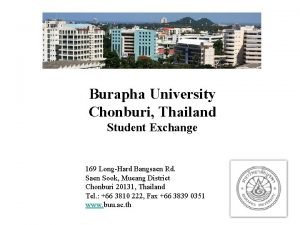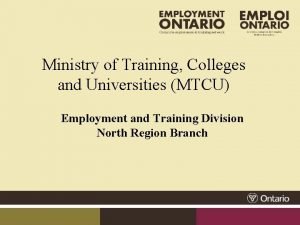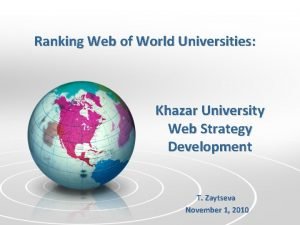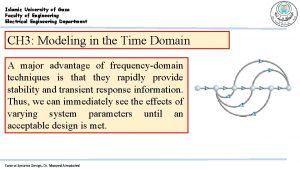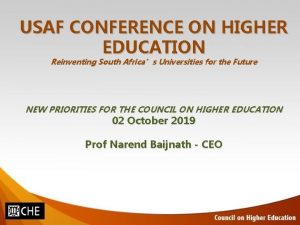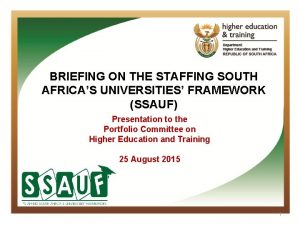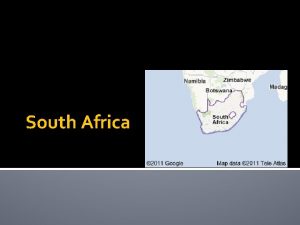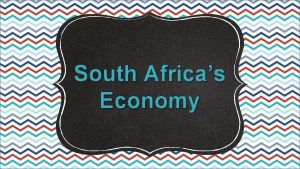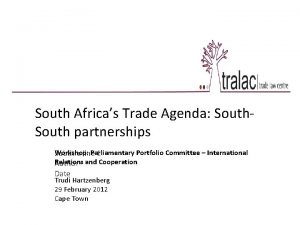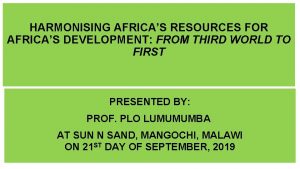Reinventing South Africas Universities for the Future Reinventing














- Slides: 14

Re-inventing South Africa’s Universities for the Future Re-inventing South Africa’s South African Union of Students presentation: Universities for the Future Thabo Shingange (National Spokesperson) 03 October 2019, CSIR

PRESENTATION OUTLINE § Historical Context § Contemporary debates § Neo corporate university

INTRODUCTION § Since the 1994 democratic dispensation, not many citizens would have imagined that 21 years into South Africa’s democracy, students in institutions of Higher Education would bring the country to a standstill through a series of political events like the student protests of 1976 § Not many would have imagined such events unfolding, not because protest in a democracy is unimagined, but simply because South African citizens, and the youth in particular, had assumingly become passive agents of change and consumed by the glooming narrative of the ‘rainbow nation’ the ‘born-free mantra’ (Mabasa, 2018), so much so that little attention was paid to the catalytic conditions prone to post-apartheid Higher Education framework, the conditions surrounding universities and the continued embedded patterns of exclusion drawn from the legacies of its past. § Any attempt to understand the above conditions, the subsequent manifestation and analytical appreciation of the 2015 nationwide student protests- and subsequently the birth of ‘fallism’ as a new strand of thinking amongst progressive students- needs to take historical precedence into account by framing the development of South Africa’s Higher education landscape through the history of the entrenchment of inequality in South Africa’s Higher Education landscape, conceived and birthed out of Colonialism and Apartheid respectively (Xaba, 2017).

BRIEF HISTORICAL OVERVIEW § As a synopsis, British colonialism in the Cape Colony laid the foundations for a segregationist and racial educational discourse with the introduction of a schooling system which separated the children of slaves from the children of slave masters (Xaba, 2017). § At the center of this rationale was to provide education limited to ones role in society, which - subsequently- set the framework for inequality in South Africa. § Years later, with victory of the National Party (1948) and the introduction of Apartheid policies of exclusion, segregation was reimagined, valorized and stratified by law into four racial categories consisting of superiority and inferiority complexities; namely: White, Indian, Colored and Black respectively (Posel, 2001) § By this standard, the Apartheid government introduced policies and laws- amongst others, the Bantu Education Act of 1955 and the Extension of Universities Act of 1959 - aimed at enforcing a racially hierarchized basic schooling system and Higher Education sector (Posel, 2001).

A BRIEF HISTORICAL OVERVIEW § As such, read together, colonial segregation in education and Apartheid policies of exclusion introduced educational paradigms which produced the framework and patterns of historically (and currently) ‘white’ universities and historically (and currently) ‘black’ universities today. § Albeit the introduction of Democracy in South Africa (1994) steered apartheid racist laws and practices out of formal existence (some of which have been mentioned above), which opened up access for all qualifying for any public university regardless of race, the rationale for increased access has been framed largely in instrumental terms, subjecting the democratic project to a series of compromises in concretising its goals and objectives, which, according to Naidoo (2015), handed over the ideals of the Freedom Charter and any possibility of opening the doors of learning and culture to all, to the logic of the market. § Badat (2010) further explains that the relationship between democracy and equal access is not enough to overcome social and economic patterns of exclusion namely because universities in general, and historically white universities in particular maintain deeply rooted colonial and racist institutional cultures as a legacy of their past which, as students have argued, continue to socially exclude and in effect alienate non-white students

BRIEF OVERVIEW SUMMARY § Therefore, as embodiments of colonial expansion, and with the aided valorizing of racial hierarchies, laws and practices, it is no surprise that in 2015 universities across the country, and historically white universities specifically, became a site of resistance and political mobilization mostly by, though not exclusively to, black students, who engaged in an ideological, philosophical and political discourse known as ‘fallism’- ‘new’ to post-colonial and post-apartheid South African student politics.

CONTEMPORARY DEBATE § To place the matter into perspective, Naidoo (2015) argues that at the heart of 2015 student protest in South Africa has been the immediate question of the right to learn; asking how education can be a right yet placing it to the logic of the market. § The demand? Free education § 1. Fee-free (State) § 2. Free decolonized (university) § These two points reignited historical debates on social justice and the vision of an ideal postapartheid South Africa. § The protest action is primarily caused by two phenomena: § 1. the broader societal disconnect with persistent class, race, gender inequalities in SA. § 2. the negative socio-economic impacts of the neo-colonial corporatized higher education § The student movement proposals are crucial for restructuring the neo-colonial corporate university

CONTEMPORARY DEBATE § § § The reality is that the ideals captured in the White Paper on HE (1997) have not been achieved. According to this document, an inclusive system “promotes equity of access, fair chances of success to all”. And more importantly, “eradicates all forms of unfair discrimination whilst advancing redress for past inequalities” (Doe, 1997: 1). The data on throughput rates, curriculum reform, transformation and student movement political demands highlight the minimal progress made in attaining these three goals. Moreover, the race-class-gender inequality power nexus that is prevalent in broader society characterizes the HE system. As SAUS we argue that the current wave of student activism is motivated largely by mobilization that seeks to challenge the pedagogy and governance practices associated with a neo-colonial corporatized higher education model In turn, a conception of free education that widens the discourse to appreciate both material and ideational freedom lies at the center of this new discourse.

THE NEO-COLONIAL CORPORATE UNIVERSITY § The following key features are characterise the neo-colonial corporate university § 1. Epistemic coloniality § it entrenches the ideological hegemony of colonialism and coloniality (the sustenance of colonial power relations, knowledge systems, and political identities in the contemporary epoch). § This explains the qualitative shift in this generations student politics, which transcend the political economy centered approach of the established student movement § It is also inspired by what Walter Mingolo terms “epistemic disobedience” (Mignolo, 2009): a movement challenging Eurocentric pedagogy in HE. § As a result, the fallist perspective on free education cannot be reduced to fiscal justice and socio-economic redress § 2. international benchmarking § The obsession with international rankings based on world-class accreditation (divorced from the national context) § They use western elite university criteria that entrenches commodification of education

THE NEO-COLONIAL CORPORATE UNIVERSITY § Rationalisation, commodified research output and market place credibility constitute the core principles of these rankings. § The end result is budgeting that discards socially beneficial initiatives such as redress, employment equity, academic development programmes and funding for needy students. § Moreover, the term ‘world class’ is uncritically accepted and institutionalized without examining its epistemological origins § This concept is value-laden and secures epistemic coloniality by making western universities, and their associated pedagogical practices, as the universal unquestionable measure of intellectual excellence. § In short, world-class assimilation is naturally linked to subverting the epistemic and socio-economic independence of universities § 3. Market colonization and the corporatization of academia § The corporatization or market colonization of academia has been at the center of higher education debates for years. § Cox (23013: 2) defines this phenomenon as thee “dependency of universities on the marketplace, and thus the corporatization of the university system. The university culture increasingly privileges those disciplines that can patent, brand market products through corporate partnership over disciplines that can patent. Brand market products through corporate partnerships over disciplines that encourage critical thinking designed to engage democratic citizenship and to challenge the status quo” § In this sense, market colonization erodes critical pedagogy by placing cost-recovery at the center of choices on research projects, programs and curriculum. § This in turn, produces teaching and research primarily informed by profit, fiscal austerity, and quantitative assessment models.

THE NEO-COLONIAL CORPORATE UNIVERSITY § § § § § 4. Authoritarianism and violence of neo-coloniality The development of despotic managerialism is a cause for concern Authoritarian corporate models of governance and management have been introduced in ALL institutions of HE, with the primary objective of increasing profit, efficiency and effectiveness. This has largely led to subversion of democratic values such as social equity, redress and inclusive (rather than rubber stamping) decision making. Corporate governance coincides with the migration of former chief executive officers, consultants, and business elites into managerial positions in universities These managers seek to re-orientate governance, even student governance, towards market colonization and despotism characterized by soft and hard power. Two phenomena drive this: 1. market colonization 2. monopoly over violence

CONCLUSION § While the issue of fees increases might be resolved in the immediate term, but the discussion about free higher education forces us to reopen a national debate that the student movement lost in the mid-1990 s when transformation became reduced to a series of technocratic interventions, and the representation of different constituencies (or “stakeholders”) in institutional processes and structures increasingly began to dominate the discussions about and approaches to transformation. § As this happened, our struggles for changing the very nature of structures of governance such as councils, curricula, forms of learning and teaching, and a decommodified system overall, slowly disappeared. § As students problematise the state of transformation today, arguing that current technocratic agendas do not serve the interests of a majority of students or society more generally, it is perhaps time for us to revisit some of the decisions that were settled on in the past.

CONCLUSION § Key to this should be a reopening of discussion about the ways and forms of governance at the institutional level. In many institutions, if not all, the defeat of student representatives in council around the proposed fees increase has resulted in the student leadership and general student body questioning the make-up of council once again, and insisting on the ratification of any decision around fees by a university assembly, a formation imagined by protestors as an alternative, open, democratic space constituted by all members of the university community. § In truth, the crisis has existed since the transformation project began, as a result of a series of compromises in concretising its goals and objectives, handing over any possibility of “opening the doors of learning and culture to all” to the logic of the market. § Students are forcing us to acknowledge that resources need to be mobilised in different ways and the transformation project opened up in more democratic ways. We need to listen to them – and learn from them

Thank You
 Whats africas largest lake
Whats africas largest lake How to expand your business without reinventing the wheel
How to expand your business without reinventing the wheel Censydiam wheel
Censydiam wheel Inventing and reinventing organizations
Inventing and reinventing organizations Esercizi future continuous e future perfect
Esercizi future continuous e future perfect By the time future perfect
By the time future perfect Old south vs new south streetcar named desire
Old south vs new south streetcar named desire First aid for colleges and universities
First aid for colleges and universities Onet thailand
Onet thailand Egyptian universities network
Egyptian universities network Chon buri colleges and universities
Chon buri colleges and universities Mtcu
Mtcu Ranking web of universities
Ranking web of universities Should universities departments engineering
Should universities departments engineering Stand together universities
Stand together universities










